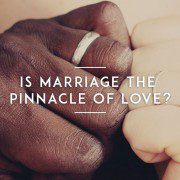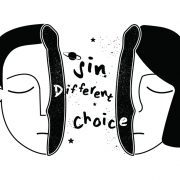Reaching Out to the Church That Rejected Me
Written By Thaddeus Lee, Singapore
One morning when I was eight, I raced to the canteen excitedly with a female friend, all too keen to escape the prison cell of the classroom. In my eagerness, my hand accidentally swung upwards and lifted her skirt.
“Or hor, I’m gonna tell Teacher!” she giggled. Her laughter gave me the impression that she wasn’t serious or disturbed, so I merely shrugged it off and ran along. But right after recess, halfway through English class, my class teacher abruptly ordered me to stand and accused me of molest. I was too stunned for words. She took that to mean I was guilty.
For the next four years, I was mercilessly teased by my schoolmates. The boys started flinging labels at me, labels which we didn’t fully understand at our young age: pervert, sex maniac, molester. When the novelty of the name-calling wore away—they wanted a bigger, more formidable monster—the teasing gradually evolved to hold homosexual connotations: faggot, ah kua, pondan.
The weekday torment continued straight into the weekends. Church was a small community of 50, my relatives constituting a sizeable portion of the congregation. From the age of four, I was frequently picked on by an older cousin. Every other kid had a sibling around their age; but my sister was 17 years older than me, and so I was his natural target. The rest of the children followed his lead. Occasionally they’d let me play with them. At those times, I was always put at a disadvantage, or was the object of their derision. During ball games, for example, I’d be hit on purpose.
Usually, though, I was simply excluded from their games. Far too many Sunday afternoons were spent gazing through the window of the children’s activity room, watching the other kids play. I would bang on the locked door and shout for them to open it, but they willfully ignored me every time. It felt like I was watching a movie—I could hear and see them through the glass, but to them I was invisible.
The years of ostracism slowly emptied that cup of self-worth that every child starts out with. As the constant exclusion slowly killed me on the inside, I gradually grew more withdrawn. My parents told me to ignore the bullying, and they saw my withdrawal as merely a phase that would pass. Church, rather than being a refuge from school, was a place where the bullying continued. Ironically enough, my exclusion from the “people of God” brought me closer to Him; I didn’t feel safe with the people around me, God was the only one I could count on. Without a place in the community, I pushed myself to fix my eyes on Him, seeking Him in prayer and the Word.
Despite being an active child, I didn’t gravitate towards sports like the other boys did. I wasn’t uninterested, just apprehensive—I associated physical games with rejection and humiliation. When my classmates played basketball during recess, I’d simply watch from the sidelines, never joining in. Once, when I was 11, I noticed some boys from the neighboring secondary school playing shirtless. I found myself watching, fascinated, drawn to the sight somehow. This was also around the time puberty began.
Even then, my growing attraction to boys confused and disturbed me. Because of Scripture passages I’ve come across from time to time, my gut feeling was that something wasn’t right about my attraction. I didn’t want it. In Primary Six, I scoured the Internet for “how to change”. My research went on in secret for years, focusing on Christian material.
Learning to Redirect My Attractions
Eventually, with the insight that various Christian resources helped me attain, I came to better understand what was happening inside me. I realized that my attraction to males was partly rooted in a fear of them. To the boys around me, I was a reject, someone they ridiculed and despised. Ironically enough, as this alienation cut me off from the world of men and robbed me of my own sense of masculinity, my apprehension of men slowly turned into an exoticization, and then an eroticization. I dwelt in the tension between fear and fascination, anxiety and admiration.
I learned to give up my urges and desires to God instead of trying to fight them. Instead of dwelling on my attractions, I learned to redirect them to God and seek to understand my core emotional needs instead. That helped me cultivate and practice an attitude of seeking God and relying on Him. Daily, I was aware of my absolute need for Him in my quest towards holiness.
As my traumatic encounters with boys resulted in a broken conception of male identity, a crucial step I had to take in restoration was to form healthy male friendships. Feeling like one of the guys was necessary in restoring a healthy self-identity by affirming my masculinity. However, I was still a teased and rejected 12-year-old, shunned in school and bullied by the same boys in church; needless to say, forming brotherly friendships was a challenge.
In Secondary Two (eighth grade in American terms), I followed a friend to her church and took root there, longing for a genuine Christian community that my home church sorely lacked. Through joining a youth cell group and a ministry, friendships were formed, and I crawled out of my shell. I began to heal, simply by having healthy friendships with guys, feeling accepted, and having the freedom to be a normal teenager.
Throughout this time, I was careful to love my male peers as brothers and see them rightly. I never let my sexual inclination define my identity. Instead, I saw my homosexuality as a journey with deeper underlying issues to be resolved. I hoped to have made significant progress by the time I enlisted in the army, a requirement for all Singaporean men, and my perceived rite of passage of masculinity. Then, if all went as planned, I would be healed by university—with a girlfriend in arms, and marriage on the horizon.
Years of Struggle
Reality, however, was messier. Our youth ministry became split according to the different academic institutions we attended, and I was thus separated from the friends I had been with since secondary school. Dealing with both the pressures of a new school system and environment, and the loss of my former support system, my social anxiety and depression erupted.
During break times at school, I would hide in the toilet and cry—I had nowhere to go, no one to be with. I dropped out of school, and insomnia eventually became 15-hour naps, a different form of suicide. I left church, since the cell group I had known and loved was gone. Throughout this period, nobody called or asked how I was doing. Perhaps the others were too busy juggling school, extracurricular activities, church, and ministry. We were in different worlds now.
My enlistment letter was a rude wake-up call. Besides feeling wholly unprepared, I was nowhere near the target I had set for myself years ago, far from the oasis of emotional healing. Desperate and afraid, I jumped back into my church and joined the National Service (NS)* cell group. However, as the only one from a non-military force, I didn’t get their army-related jokes and references. I sat clueless, a foreign onlooker, as they laughed among themselves. My insecurities about my masculinity were also exacerbated. My differences from them—in terms of physique, ability, agility, mannerism—felt all the more prominent. Constantly, I was afraid that they might find me out and I would be further ostracized.
As my distance from the cell group grew, my desires for healing and brotherly connections lay unfulfilled. Despite feeling disconnected, I kept going, hoping to regain the spiritual family I once had. In sore need of friendship and restoration, being physically present in this community was the least I could do. Yes, I was wholly alienated from them, but there was nowhere else to turn. Perhaps, if I kept going, I could rediscover the bonds I longed for.
Towards the end of NS, I decided to open up about my same-sex attraction to a few trusted church mates. They were leaders, deeply involved in ministry, and it felt reasonable to take this step of faith, to let them accompany me in this pursuit towards healing. Perhaps they would be compelled to journey with me in love. Perhaps the divide could be repaired somewhat as I opened myself to them.
But as I began to share my story, a few stopped talking to me entirely. Some didn’t know what to say. Some proceeded to avoid the topic altogether, as if the conversation had never happened, as if they willfully forgot that part of me. Mostly, I was met with stunned silence. No one ever probed further, and as a result, assumptions were likely made.
The reactions were unexpected and disappointing. I had invested much in the community, and served alongside these friends. They seemed to perceive homosexuality as plainly a sin issue, painting the zebra stripes of right and wrong without regarding the difference between inclination and action. Was I to them an unforgivable sinner, drowning in a lifestyle that scorned redemption? Did they not see that I was trying to lead a life pleasing to God? It took effort to pry myself open, to entrust Christian brothers with this part of me. It seemed they would’ve preferred that I remained sealed shut.
Now, the late night suppers and midnight chats were a thing of the past: having been rejected by the church yet again, I accepted that loneliness was the church’s end for me. I was never asked along for group suppers again. Though I cried out to God over and over again, He seemed silent throughout this time. Church had devastated me.
In NS, I worked closely with a fellow gay recruit. He was fun, extroverted, and spontaneous. While I kept my distance initially, his humor and carefree attitude eventually broke down my defenses. Over long and boring hours of sentry duty, he gradually became a friend. He tried introducing me to gay pubs, and I finally conceded to his coaxing. Besides, my church community was by now merely a memory; with none of my own friends left, there was no harm meeting his.
However, even in the gay community, my attempts at friendship weren’t successful. Many gays I interacted with couldn’t seem to comprehend brotherly intimacy, or maybe even thought me naive to believe it existed. For many, sex was the goal. Some were genuinely confused when I tried to explain myself. Some thought I was in denial, or just weird. Eventually, I left, thinking, “Even here I don’t belong.”
Where I’m At Now
Fast forward several years, and the peers I grew up with in church are now married, or planning for marriage. It’s a phase I can’t identify with, and we’re no longer in contact. While my life is given to Christ, I no longer regularly attend church—there’s always that apprehension, and even distaste sometimes. You can’t blame me for it, though; the church preaches love yet practices rejection, and I fear getting hurt again.
The church has much to say about LGBT issues; yet when it comes to doing, we seem stuck, immobile. Throughout my journey, I pursued God, holiness and healing the best I knew how, but I couldn’t help feeling like the church failed to walk alongside me. My relationship with God occasionally gets clouded by my feelings of betrayal by the church community. The heartbreak and disappointment I’ve experienced often morphs into anger at God’s people, which leads me to close my heart off from God. I am tired of letting this affect my walk with Him. I must let my angst settle into dust, so peace can rise.
Faith is the assurance of things hoped for, the confidence in things yet seen (Hebrews 11:1). With faith, I pick up my angst and turn it into action. Now, instead of waiting for the church to help individuals like me, I accept my responsibility to be part of that change.
By God’s grace, He has led me to two mentors who have been pivotal in my journey: one of them I sought out myself, the other was recommended to me by a friend. Having submitted to older, wiser, male Christian mentors, I’m now also reaching out to fellow Christians with a heart for same-sex attracted individuals, hoping to help the church understand our struggles. I want the church to be aware of the many others like me living in the shadows.
As the church provides a community that singles can call home, as we learn to teach sex and sexuality rightly, and as we reintroduce the radical and all-accepting love of Christ into our daily lives, perhaps then the church will become a home that SSA individuals can step into, just as they are. SSA individuals will not feel a need to struggle in silence, as the church will embrace them and journey with them in love. Rather than having to hide from fear of stigma and judgment, SSA individuals will find a safe community that accepts them and affirms their worth.
* National Service (NS) is compulsory duty in the uniformed services for all Singaporean males upon finishing their tertiary education (but before any higher education). This usually includes two years of full-time service.










Thank you. I almost have the same situation like yours but luckily I’m not been bullied yet I still can’t fit myself in church.
Thank you. As a former gay man I put myself in a Christian rehab where they said they could help. The journey was scary at times but worth it. I have not identified as Gay 23 years now. I am married with kids. I am happy and whole. God is powerful!! He loved me and always did, but wanted me restored.
Dear Thaddeus,
I am a fellow Christian and a pastor in Maine. I am so sorry to hear of all the rejection and resulting isolation you have experienced within the church—I can only imagine how hard that must be. Thank you for sharing, and I pray that God gives you fellow believers as friends and brothers—to walk alongside you, to mutually spur one another on towards Jesus, and to be expressions of God’s kindness as you continue to seek Him.
I grew up with rejection,I’m 62 now and have the scars and pain still attached. My attention to ways to feel close went the wrong way, 3 years in prison, falling into sin being a Christian for 39 years, churches don’t seem to understand Jesus forgiveness,they don’t remember where they came from. … Next week I will be going to a new church with fear….. Pray for me !